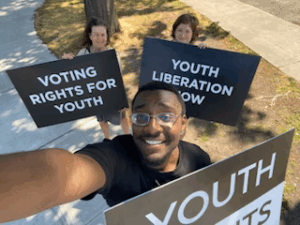Adam B. Kushner has a great piece in the Washington Examiner about Sen. John McCain’s commencement address at Columbia last week that was “cloaked in a terrifically condescending homily about the arrogance of youth.”
NEW YORK – Last week, as they sat in the pouring rain, John McCain insulted Columbia’s graduating class. He also delivered praise, a paean to freedom, a denunciation of relativism (“a mask for arrogance and selfishness”), and a plea for civility in disagreement — all of which was movingly and rightly argued. But it was cloaked in a terrifically condescending homily about the arrogance of youth.
There had been a good deal of hubbub at Columbia in the weeks since his announcement as graduation speaker. Those left of center — more than half of the graduating class, although not all are politically active — were disappointed that the graduation-day advice about how to enter the world would not reflect their own values. Fair enough. And those on the far left — a small minority but a very vocal one — were disgusted that somebody with McCain’s worldview could even be invited to address Columbia, which they had spent their undergraduate years trying to move leftward. (This was silly; one of the best things about a liberal arts education is that exposes you to different strains of thought — if only to strengthen your own.)
Protests were organized. Fliers were circulated. And pins were distributed saying, “McCain Does Not Speak for Me.” Many graduates affixed them to their gowns, and some parents followed suit. All of this seemed a bit hasty to me, given that nobody yet knew exactly what McCain would say. And, in the end, most of what he said was conciliatory and ingenuous. With regard to their arguments against him, he said, “It’s your right and your obligation. I respect you for it.”
But he pre-empted this with a nasty oration. “When I was a young man,” he told the graduates, among whom I count my brother, “I was quite infatuated with self-expression, and rightly so, because, if memory conveniently serves, I was so much more eloquent, well-informed and wiser than anyone else I knew. It seemed I understood the world and the purpose of life so much more profoundly than most people. I believed that to be especially true with many of my elders, people whose only accomplishment, as far as I could tell, was that they had been born before me, and, consequently, had suffered some number of years deprived of my insights. I had opinions on everything, and I was always right.”
What an awful thing to tell a graduating class! Welcome to the world; please keep in mind that your opinions, no matter how well-expressed, are naïve and probably wrong because you’re too young to know any better. You’re not actually outdoing your elders when you argue, no matter how persuasively, against them; you only think you are. The subtext was clear enough: I’m older and you’re younger; therefore I’m right and you’re not.
The worst irony here isn’t that McCain lost an opportunity to neutralize the criticism of his invitation by talking calmly about a civil civic debate — this he did quite nicely. The irony is that he didn’t apply his own standard of civility to himself. McCain reached the zenith of his argument toward the end of his speech, when he told the soused seniors, “I ask that you consider the possibility that I, too, am trying to meet my responsibilities, to follow my conscience … each of us, despite our differences, respectful of the goodness in each other.”
He closed this line of thought, ruing, “I have not always heeded this injunction myself, and I regret it very much.” He must have had a very regrettable Tuesday.





